On the afternoon of November 15th, the First International Conference on Translational Applications of Frontier Science and Technology & SNDA Scientists Industrial Collaboration Summit was successfully held in Wenzhou City, Zhejiang Province. This conference, one of the key events during the 8th China Special Food Conference, was organized by the CNHFA and supported by Inner Mongolia Mengniu Dairy (Group) Co. With a focus on cutting-edge global science and technology, the conference aimed to foster international scientific and technological exchanges and collaboration, promote the transformation and utilization of scientific and technological advancements, and pave the way for an open and innovative scientific future. The event was hosted by Zhang Hongyu, Director of the Institute of Biomedical Research at Wenzhou Medical University.
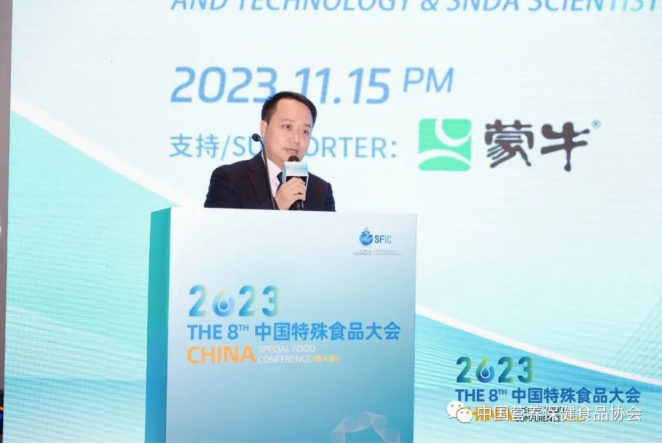
Zhang Hongyu, Director, Institute of Biomedical Research, Wenzhou Medical University, China
Wan Chao, Director of the Health Food Registration Division at the Department of Special Food Safety Supervision and Management, State Administration for Market Regulation, and Zhang Xuguang, Assistant Vice President of Mengniu Group and President of the Nutritional Science Research Institute, were among the distinguished attendees who delivered speeches.
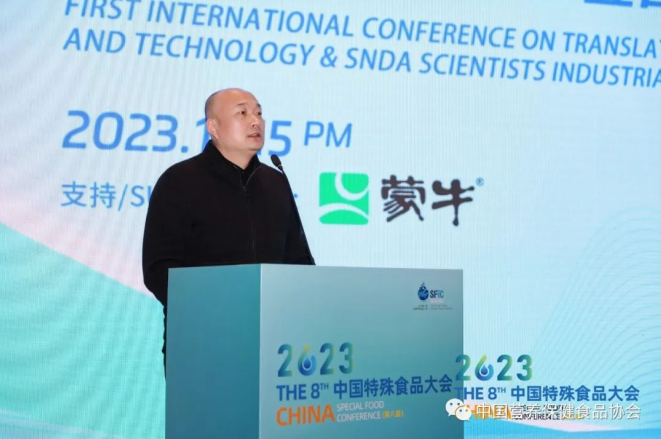
Wan Chao, Director, Health Food Registration Division, Department of Special Food Safety Supervision and Management, State Administration for Market Regulation
Wan Chao emphasized that 2023 is a pivotal year for industrial development, particularly within the health food sector. It marks a milestone in the industry's history, moving away from past dependence on government support and product approvals. He highlighted that scientific claims have also transitioned from a government-guided development model to a more diverse approach. The entire system has undergone significant reforms in this year. Wan Chao expressed the hope that this summit would help experts lead numerous industrial policies, allowing science to play a greater role in guiding and supporting health food advancements.
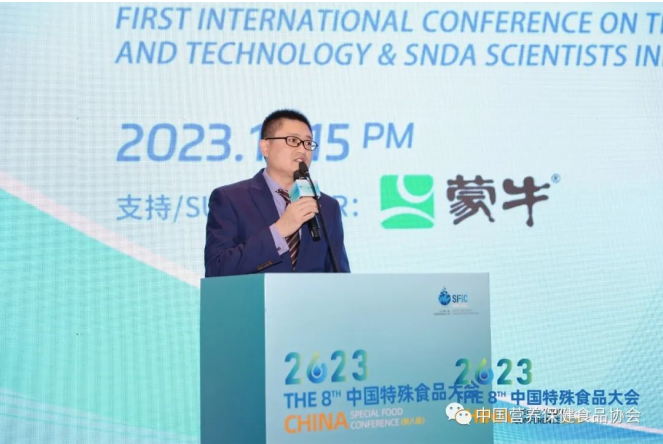
Zhang Xuguang, Assistant Vice President of Mengniu Group and Director of Nutritional Science Research Institute
Zhang Xuguang emphasized that core technological development across industries relies on integration, underlining the importance of technological integration. SNDA represents the integration of key areas: “S” for synthetic biology, “N” for nutrition and health, “D” for digitalization, and “A” for artificial intelligence. These letters symbolize not only the specific disciplines but also the fusion of related technologies, applications, and scientific research transformation across the entire industry. He encouraged experts in attendance to openly share their insights, spark collaborations, identify potential cooperative interests, and contribute to the technological integration and transformation of the industry.
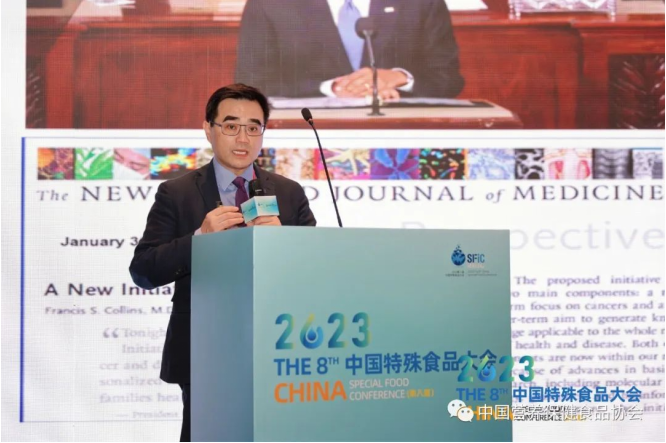
Chen Zhengming, Fellow, the European Academy of Sciences; Chair Professor of Epidemiology, University of Oxford, UK
Chen Zhengming, Fellow of the European Academy of Sciences and Chair Professor of Epidemiology at the University of Oxford, UK, shared insights into histological research and cohort studies. He elaborated on the theme “Empowering Biobanks with Omics to Advance Precision Health”, emphasizing the historic opportunities and challenges presented by the rapid development of precision nutrition and health in China. He expressed the desire to promote scientific discovery through multi-omics data output and data mining tools, aiding in the comprehensive understanding of various diseases and intervention methods, ultimately advancing precision nutrition and health management for all.
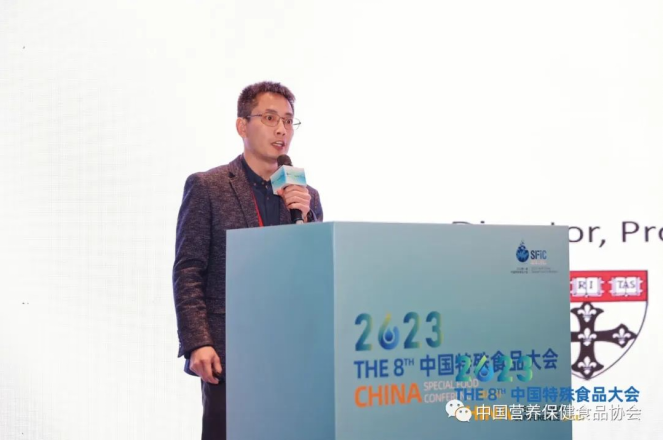
Liang Liming, Director, Program in Genetic Epidemiology and Statistical Genetics, Harvard University
Liang Liming, Director of the Program in Genetic Epidemiology and Statistical Genetics at Harvard University, presented extensive domestic and international data and research findings on “Using Molecular Profiles to Characterize Individual-Specific Exposure and Response to Dietary Intervention”. He underscored the need for measuring an individual's ability to utilize dietary nutrients when establishing scientifically sound nutritional programs. Leveraging advanced methods, technologies, and data analysis, including various analytical and testing techniques, multi-disciplinary approaches, systems biology, and big data analysis, will facilitate the creation of a robust personalized nutrition database. This, in turn, will explore the potential impacts of nutritional interventions on individuals and optimize nutritional recommendations and interventions for disease prevention and treatment.
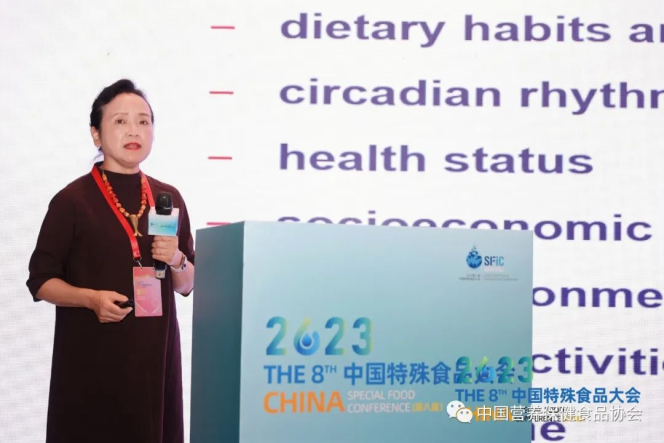
Lin Xu, Principal Professor, Shanghai Institute of Nutrition and Health, Chinese Academy of Sciences; and Hangzhou Institute of Advanced Study
Lin Xu, Principal Professor at the Shanghai Institute of Nutrition and Health, Chinese Academy of Sciences, and the Hangzhou Institute of Advanced Study, shared innovative strategies for accurate prediction and intervention. She discussed leading databases, the latest experimental data, and related research outcomes related to “New Thinking and Strategies for Precision Nutrition Research and Application”. Lin Xu stressed the importance of applying new ideas and strategies to simplify and apply multidimensional phenotypic data, multi-omics testing and analysis, nutritional knowledge maps, and intervention decision trees to clinical and health management. Her goal is to create a closed loop for intelligent nutritional and health management, providing scientific and technological support to optimize people's nutrition and promote their health.

Li Yixue, Chief Scientist, Guangdong-Hong Kong-Macao Greater Bay Area Node Platform, Guangzhou National Laboratory and National Biological Data Center System
Li Yixue, Chief Scientist at the Guangdong-Hong Kong-Macao Greater Bay Area Node Platform, Guangzhou National Laboratory, and National Biological Data Center System, delivered a speech on the “Introduction to Biomedical Big Data Operating System”. He shared insights into data-intensive research challenges and presented Bio-OS as a solution. Li Yixue emphasized the importance of data processing, especially in the context of the current exponential growth of data. He highlighted the challenges posed by data modalities, forms, high dimensionality, complexity, and more. He stressed that the interconnection of biological data at multiple levels is crucial for accelerating industrial development and upgrading.

Liu Long, Dean, School of Bioengineering, Jiangnan University
Liu Long, Dean of the School of Bioengineering at Jiangnan University, focused on the “Innovation and Application of Food Bio-manufacturing Cell Factories”. He shared his research on using synthetic biology methods and technologies to create microbial cell factories for efficiently synthesizing functional food ingredients and nutrients. Liu Long pointed out that traditional methods for producing functional nutrients, such as natural extraction and chemical synthesis, are complex, low-yield, costly, and environmentally polluting. He advocated for the use of synthetic biology to construct “cell factories” through methods like gene circuit construction, optimization of metabolic pathways, and high-throughput screening. These advancements will play a pivotal role in manufacturing and developing food products in the future.
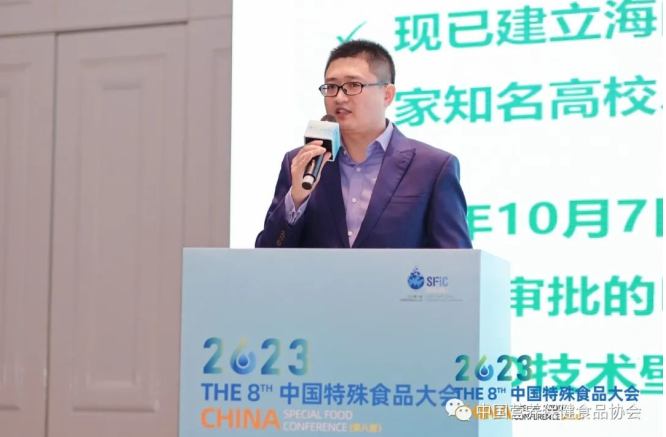
Zhang Xuguang, Assistant Vice President of Mengniu Group and Director of Nutritional Science Research Institute
Zhang Xuguang shared Mengniu's industrial research and development strategies, cognitive layout, and industrial outlook. He highlighted that science and technology constitute the core competitiveness of the industry. Compared to mature markets like Europe and the United States, China's nutrition and health market is still in its early stages of development. Transforming from a “product follower” to a “technology leader” by investing in high-tech R&D, establishing a comprehensive scientific system, creating an efficient technology transformation platform, and fostering a competitive yet cooperative technological market environment are critical challenges that the industry must address. These initiatives align with Mengniu's development strategy and future goals.
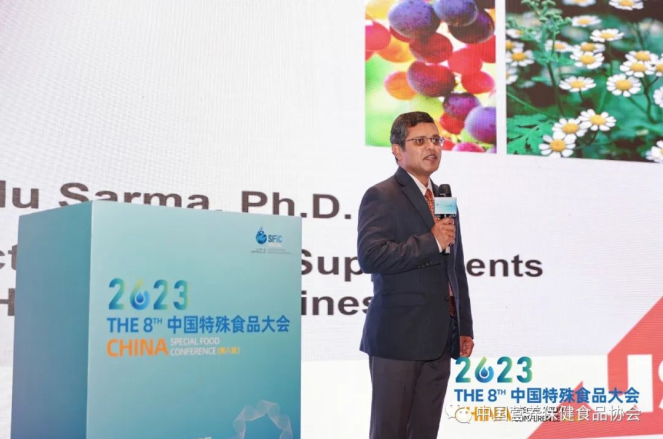
Nandakumara Sarma, Director of Dietary Supplements and Herbal Medicines, U.S. Pharmacopeia
Nandakumara Sarma, Director of Dietary Supplements and Herbal Medicines at the United States Pharmacopeia, discussed quality control issues related to dietary supplements and proposed solutions. He pointed out that with increasing market demand, the quality of dietary supplement ingredients and products has become a key concern for consumers and regulators. To comply with current Good Manufacturing Practices (cGMP) and ensure quality, companies must establish product standards encompassing properties, purity, specifications, and ingredients. Sarma highlighted the importance of applying USP Dietary Supplement Monographs, General Principles, and Quality Standards to various tests to ensure the quality of dietary supplement products, ultimately enhancing industry credibility and consumer health.
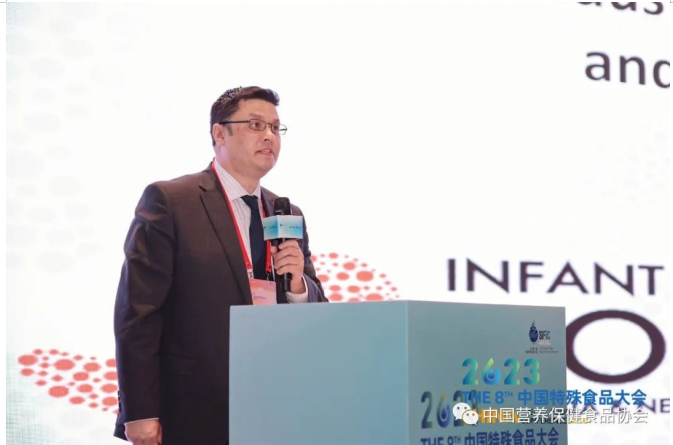
Jonathan Chew, Chief Executive Officer, Infant Nutrition Council
Jonathan Chew, Chief Executive Officer of the Infant Nutrition Council, emphasized the interconnectedness of China, Australia, and New Zealand. He introduced research findings related to the nutritional and health needs of infants and young children, along with innovations in infant formula core technology. Chew expressed the hope for continued communication, information exchange, and dialogue in the future to share scientific research results and innovations. He also emphasized the importance of fostering interconnections between industries in China, Australia, and New Zealand to promote cooperation and high-quality development in the infant formula industry.
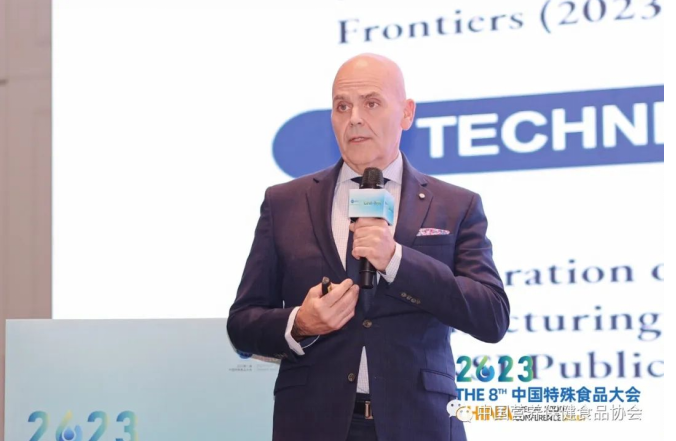
George Paraskevakos, Executive Director, International Probiotics Association
George Paraskevakos, Executive Director of the International Probiotics Association, shared insights on “Trends, Developments, and Challenges in the Biological Sector”. He noted that research into the human microbiome's impact on health and disease continues to grow, fueling the global probiotics market and related areas. Paraskevakos highlighted the need to navigate regulatory policies, translate scientific findings, and overcome challenges related to prebiotic, probiotic, and postbiotic product production. These efforts are crucial for enhancing the industry's credibility.

Chris Gearheart, Director of Growth & Engagement, Global Organization for EPA and DHA Omega-3s
Chris Gearheart, Director of Growth & Engagement at the Global Organization for EPA and DHA Omega-3s, presented the “EPA and DHA Omega-3 Markets: A Global Overview”. He discussed the increasing popularity of DHA and EPA omega-3 supplementation in consumers' daily diets, driven by growing healthcare awareness and scientific research support. The EPA and DHA omega-3 market exhibit diversity and dynamism, with varying growth rates worldwide. However, the sector faces its unique challenges. Investors, regulators, and consumers are increasingly concerned about sustainable EPA and DHA Omega-3 growth, necessitating effective and safe Omega-3 solutions from dietary supplement manufacturers.
(The CNHFA holds all rights to the information published on this website. For sharing and republishing queries, please contact: cnhfa@cnhfa.org.cn. Authors and sources should be indicated for sharing and republishing purposes.)

